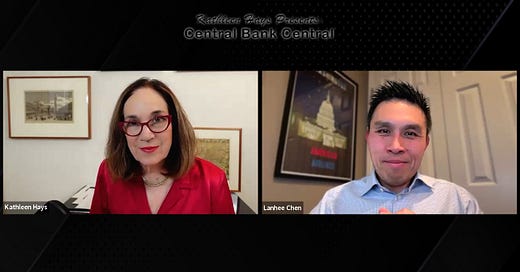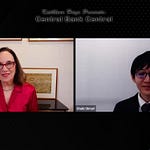Lanhee Chen wears many hats that make him uniquely qualified to weigh in on Donald Trump’s record 100-minute address to Congress this week. I first met him at Stanford University’s Hoover Institution where he has been fellow of Public Policy and lecturer. He’ s not only a teacher, he’s a practitioner having advised Republicans like Marco Rubio and Mitt Romney and more. Chen has played senior roles in both Republican and Democratic presidential administrations and been an adviser to four presidential campaigns, including as policy director of Romney-Ryan 2012.
So who better to ask what are the main takeaways from the President’s speech?
State of the Union: Main Take-away 00:01:19.520 --> 00:02:00.720
I think the main takeaway is that there's a level of consistency in President Trump. Right? I mean, if you look from his campaign, the things he wanted to do on the campaign trail, the things he emphasized, the executive action we've seen in the 100 days, the degree to which he, you know, a lot of people have characterized as flooding the zone. I think that's probably accurate. Last night's speech had hallmarks of all of those things and whether we're talking about the policy focus. You know, we heard about tariffs. We heard about immigration. We heard about tax reform. Those were issues we knew were important to Donald Trump when he was a candidate, and they've been important to President Trump since he took over.
Consistency, Showmanship, Partisanship 00:02:01.042 --> 00:02:16.519
…you know, I think there's a lot of consistency. I think that it's something that we've come to expect from him. There's a certain element of showmanship to the speech. There's a certain element of partisanship and polarization which I think has gotten worse in American politics, where.
Petulant Democrat reaction 00:02:16.520 --> 00:02:33.970
…you had the reaction of some Democrats which I frankly would characterize as petulant in some ways, but you know, understandable, I suppose when you think about the political dynamics so overall, I would say, you know a lot that I expected, and more.
Trump believes in Tariff Power 00:02:52.270 --> 00:03:33.160
I think, at core. What we know is that President Trump has always believed in the power of tariffs as a negotiating tactic for their ability to raise revenue which economists and others might have differing points of view about exactly how much revenue it will produce for incentivizing behavior, and frankly to be used as an instrument of beyond economic policy, I would say national security policy as well. So I think what you saw was a consistent through line, an emphasis on tariffs. You heard him talk about reciprocal tariffs, which, from an executional perspective, I think is very hard to do. It's actually really tough. And you're going to need a lot more people to really enforce that kind of policy change.
Trump admits Policies have costs 00:03:33.160 --> 00:04:04.679
I thought what was interesting about that Kathleen was the degree to which he was willing to admit. Tariffs will result, in short, term disruption in the form potentially of… he didn't say this - but what he meant was higher prices, maybe constrained supply in some cases, and so I do think that tariffs were one big element of the speech last night. A second is tax reform.
Tax Policy a
lso in sharp focus 00:04:04.820 --> 00:04:29.769
… he didn't say as much on the corporate side. Obviously there's the individual tax cuts that are expiring or sunsetting. At the end of the year. He emphasized the importance of the No tax on tips proposal, the No tax on social Security Benefits proposal. The interesting one added last night was a tax deduction for the interest on car loans as long as the car is made in America. I thought that was an interesting proposal.
Bringing manufacturing back home 00:04:30.050 --> 00:04:39.809
it's all part of a piece of How do you bring industry and manufacturing back to the United States? And I think that was a big theme last night that went through all those policies.
Multifaceted even personal use of Tariffs 00:05:09.140 --> 00:05:37.679
…it's not just about tariffs for the sake of tariffs, although there may be some of that, you know. I think if you look at Canada as an example to me, the focus and the seeming tension, with maybe even animosity with Canada. Part of it is about the economics. Part of it is about the trade deficit, but part of it's about the fact that I just don't think the President cares for Justin Trudeau very much right? And so I think there's a combination of a lot of different elements. I mean, I think, what we're seeing. And, by the way, I think more analysts have picked up on this concept.
Tariffs are multidimensional 00:05:43.380 --> 00:06:25.270
Tariffs are multidimensional. They're not just used for one thing or another. They can be a tool of national security policy. They can be a tool of economic policy. They can be a tool in a negotiation. And I think Donald Trump values the tariff in all of those contexts. And so that's why I think, 1st of all, you're hearing about the broad application of tariffs in a number of different cases. But, second of all, the persistence of that conversation, even amongst relationships, by the way, with trading partners who are friends and allies like South Korea, that was a topic that came up last night briefly in the speech. So I think you're right. There is a multi dimensionality to tariffs that President Trump sees, and I think clearly will be part of his policy platform going forward.
Donald “Keep ‘em Guessing’ Trump 00:07:08.960 --> 00:07:41.719
…it's tough for me to read it one way or the other. Right now. I mean, sometimes the leaks are strategic, sometimes they're leaks, you know. So it's hard to say how much of this is positioning for a negotiation, creating a different set of expectations, forcing people to be more nimble to expect the unexpected. I don't know which of those is the right answer, Kathleen, but I will say that one of the things President trump views as a strength is his ability to keep people guessing, and if nothing else. We have seen that in spades with this conversation around tariffs, and I wouldn't expect that to change anytime soon.
Democrats “checked out” of the SOTU address 00:08:15.320 --> 00:08:41.239
…if that's what they're thinking, I think they need to think a little bit harder <for a strategy>. I mean, the reality is that if you look at a number of these Democrats, they're coming from States where trump did well or trump even won. And so there's a number of Democrats who are vulnerable, who, you know, need to work with the President, and can't be seen as being in complete opposition. So I think that strategy works fine. If you're in California or Chicago or New York City, I'm not sure it works particularly well in Pennsylvania.
Democrat flatlining tactics 00:08:41.240 --> 00:09:03.040
It doesn't work in Florida, doesn't work in Ohio, doesn't work in other parts of the country where Democrats have lost a significant amount of political market share. So you know, look, it's a strategy that at one level is designed to garner news coverage. You know, people are talking about how Democrats responded. That's a story. Maybe they wanted that. But, as I said, I think
Do Democrats really want to be inclusive? 00:09:03.040 --> 00:09:27.339
most Americans will look at that and say, you know, it's pretty petulant when you can't even stand and applaud a 13-year-old cancer survivor. Or you know, when you can't even acknowledge that there are moments that we should all come together and applaud apprehension of a terrorist responsible for killing American soldiers in Afghanistan, I mean, these are the kinds of things where I think people are left wondering what's wrong with the Democratic party, and there's a lot wrong.
No central animating force 00:09:27.340 --> 00:09:47.000
I would suggest that part of what's wrong with them is that they have no central animating force, helping them decide what it is they need to be doing in this era of Trump when Trump is so thoroughly dominating the news landscape, and his party is so thoroughly dominating Washington. And I think it's a problem for the Democrats.
Decision-making Ideally and in action 00:10:21.520 --> 00:10:39.570
A President's going to put together - and I've served in other administrations - I think that the reality is the President wants around him advisors - should want around him advisors - who bring to the table a variety of points of view on any number of different issues, but at the end of the day, when the President speaks, you execute on that policy. It's not your job to second guess the President.
Political and economic agendas for Trump 00:10:39.570 --> 00:11:01.680
In this case he has a couple priorities. Number one is a peaceful resolution of the conflict. Number 2 is securing some form of a return on investment, if you will, for what America has sent to Ukraine going forward, the support will have a reciprocal element to it, and I think.
Has Zelensky come full-circle? 00:11:26.300 --> 00:11:44.589
We can debate how trump! Handled Zelensky in the oval office. There are elements of that that you look at, and different Presidents would have handled it differently, for sure. But I guess my point would be if the outcome of that is Zelensky saying, I want to come to the table for this negotiation, and I think the terms that the President's laid out are fine.
45
It’s about accomplishment 00:11:45.090 --> 00:11:59.959
Trump has accomplished something, whether you like it or not. Right? So I think it's interesting. The analysis of how are the different players thinking... it doesn't matter at the end of the day, what they think or do. It's the President and the President is, the one who sets and animates policy.
Zelensky was right! 00:12:29.240 --> 00:13:03.640
Vladimir Putin has proven to be an untrustworthy interlocutor over and over again. And this was one point Zelensky had absolutely right, which is, there's no guarantee that Vladimir Putin is going to adhere to the terms of a ceasefire. There's no guarantee that Vladimir Putin is going to adhere to anything. So it is a cause for some concern that even if Vladimir Putin makes promises about what he will or will not do. It's very hard for me to take him at his word if and until he happens to follow his word. And again, I think he's proven to be an utterly untrustworthy and frankly an adversary of the United States in a lot of ways.
Trust, verify, prepare for the inevitable 00:13:03.790 --> 00:13:27.809
So you know, while I would love to believe that we can give him the benefit of the doubt. I think we have to trust, but verify and make sure that there is a way of enforcing, or somehow ensuring, that there is a penalty to be paid if terms of the agreement aren't honored. And, by the way, I think there's some decent likelihood they won't be honored by Putin.
Trump’s strategy is an enigma 00:14:11.550 --> 00:14:36.170
I mean, it's hard for me to get into the head of what the President is trying to do here. I mean, obviously, he stated what he's trying to do, which is, he's trying to have a negotiation with 2 sides, and you don't bring both sides to the table by completely bashing one side right? You want them to believe that you will be a neutral arbiter in some ways, and how that plays in the longer run, whether it actually incentivizes Putin.
Trump on solid ground 00:14:36.490 --> 00:15:06.069
I don't know. But what I will say is that I think the American people would agree with Trump on a couple of basic tenets that he keeps emphasizing one is, America sent a lot of money over there, and there's not a ton of interest in sending a whole lot more. And, secondly, the conflict's gone on too long, and too many Ukrainians and Russians have died whose fault it is, and it's clear the President's not interested in arbitrating blame. But to me at least, those 2 premises are premises with which the vast majority of Americans, I think, agree with him.
Questions with answers blowing in the wind 00:15:07.050 --> 00:15:11.220
Kathleen Hays asks: You think he's take serious about taking back to Panama Canal? You know.
Lanhee Chen answers… Or Greenland? Yeah, I don't know.
59
A bit more on Greenland and Panama 00:15:14.990 --> 00:15:42.139
…I think he gave us a little better sense of his thinking on Greenland last night, when he talked about national security, he started to sort of hint at some of the things that people have said about Greenland for a while, which is that there is strategic value there. It's not just a crazy chunk of ice right there. There is a reason to be interested. And in Panama the Panama Canal is maybe a similar story. There's a strategic value to it
Restoring culture 00:16:56.250 --> 00:17:42.299
The President is signaling a posture on a whole set of I would call them cultural issues that many Americans believe. We've seen excess in the wrong direction over the last couple years, and you can disagree with the President's posture on transgender issues, on DEI issues, on ESG issues, on these questions around immigration, which I think has a quasi-cultural element to it as well. But what you cannot deny is that many the majority of Americans believe that we've seen excess in the wrong direction over the last couple of years, and the President is responding to that, perhaps in extreme. But that's his way of provoking this conversation and saying, I hear you. We've gone too far. I'm going to move things in a different direction.
Unpredictability: jack-be-nimble 00:18:09.030 --> 00:18:22.299
you know, the best businesses are remarkably nimble, and I think it's not so much. What I hear is not so much concern about policy, direction. One way or another. The concern is unpredictability.
How many contingencies? 00:18:22.510 --> 00:18:56.960
The concern is being able or unable to react and respond to an unpredictable environment. If you talk to most multinational Ceos, who are doing multinational supply chains, who are looking to try and figure out how they shift those they can answer that question very easily. They have a contingency for how to shift the supply chain out of China, how to shift out of certain parts of the world that's very easily doable. The problem is, once you make those arrangements and you build an infrastructure around it, you don't want the rug pulled out from underneath you.
Some shifts are more debilitating that others 00:18:56.990 --> 00:19:26.769
You don't want a set of policies that changes direction very fundamentally. So I'm not hearing. Fear is not the emotion I'm getting. The emotion I'm getting is we're going to do what we need to do to continue to deliver for our shareholders and our teammates. But what we need to have is some certainty in the policy and regulatory environment, and that is the bigger issue, I think, than what direction tariffs go in or how high they are who they're applied against. It's just having certainty.
Too soon to assess much 00:20:26.520 --> 00:20:49.499
I think it's a little early to attribute much of anything to what this administration has or hasn't done, and that's you know, I would argue. That's both with respect to claiming credit for things, but also blaming them for things right. I mean the notion that it's their fault that we have. The situation we have with eggs is ludicrous, right? I mean, there's a whole bunch of other factors
Trump has a strong team 00:21:06.670 --> 00:21:19.489
Lanhee Chen: Very strong economic team. You know, people like Kevin Hassett, who I've known for many years at the Nec. And I don't know Secretary Besson or Secretary Lutnick more than in passing, but my sense is that they're a very strong team, and they're going to have their eye on these things.
Overarching advice for Trump? 00:21:32.930 --> 00:22:03.810
Oh, I don't know that I'm in a position to give him any advice. I mean, he's clearly demonstrated an ability to command attention and to drive the agenda. But I do think that there are some areas where it's okay to want to be unpredictable. There are other areas where I would argue, you need a little bit more stability, so that the private economy and the American people know what to expect, and so I would encourage him to think about where that unpredictability is really helpful and a huge asset other areas where it's a challenge and try to tilt more toward the 1st and away from the second.
Lanhee J. Chen, PhD, is the David and Diane Steffy Fellow in American Public Policy Studies at the Hoover Institution and cochair of its Healthcare Policy Working Group, At Stanford University, he is also director of Domestic Policy Studies, lecturer in the Public Policy Program, and an affiliated faculty member of the Center on Democracy, Development and the Rule of Law at the Freeman-Spogli Institute for International Studies.
In addition to his academic appointments, Chen is a partner at the Brunswick Group, a global business advisory firm. He is also a presidentially nominated and Senate-confirmed member of the Amtrak Board of Directors and a member and former chair of the Board of Directors at El Camino Health, an integrated health system in Northern California.
Chen’s writings have appeared in a variety of outlets, including The Wall Street Journal, The New York Times, and The Washington Post, and he is a contributing writer to the Opinion page at the Los Angeles Times. He is also an NBC News contributor and appears frequently on the network’s flagship public affairs program, Meet the Press.
A veteran of several high-profile political campaigns, Chen has worked in politics and government as well as business and academia. As a candidate for California State Controller in 2022, he was the strongest-performing statewide Republican and won endorsements from every major newspaper in the state. He also advised numerous major campaigns, including four presidential efforts.
In 2012, he was policy director of the Romney-Ryan campaign, serving as Governor Mitt Romney’s chief policy adviser, a senior strategist on the campaign, and the person responsible for developing the campaign’s domestic and foreign policy. During the 2014 and 2018 campaign cycles, Chen served as a senior adviser on policy to the National Republican Senatorial Committee.
From 2014 to 2018, Chen served as a presidentially appointed and Senate-confirmed member of the Social Security Advisory Board, an independent, bipartisan panel that advises the president, Congress, and the commissioner of Social Security on matters related to the Social Security and Supplemental Security Income programs. He also served in the George W. Bush administration as a senior official at the US Department of Health and Human Services.
Chen was honored in 2015 as one of the Politico 50, a list of the “thinkers, doers, and visionaries transforming American politics.” He earned a similar honor in 2012 when he was named one of Politico’s “50 Politicos to Watch.”
In 2017, Chen was the William E. Simon Visiting Professor in the School of Public Policy at Pepperdine University. At Stanford, he was previously a lecturer in law at Stanford Law School. An eight-time winner of Harvard University’s Certificate of Distinction in Teaching, Chen has produced scholarship that has appeared or been cited in several of the nation’s top political science journals.
Chen formerly practiced law at Gibson, Dunn & Crutcher LLP and was the Winnie Neubauer Visiting Fellow in Health Policy Studies at the Heritage Foundation. He was also an operating partner and strategic advisor at NewRoad Capital Partners, a private equity fund.
Chen serves in a variety of leadership and advisory roles in nonprofit organizations. He is a director of the Foundation for Research on Equal Opportunity; cochair of the Policy Advisory Board for Free the Facts, a policy education organization; a member of the Board of Directors of the Winston Health Policy Fellowship; a member of the external advisory committee for the AAMC (Association of American Medical Colleges) Research and Action Institute; and a member of the Council of Scholars for the Better Medicare Alliance. He is also a member of the Committee of 100, an organization of prominent Chinese Americans.
Chen earned his PhD and AM in political science from Harvard University, his JD cum laude from Harvard Law School, and his AB magna cum laude in government from Harvard College. He is a member of the State Bar of California.Lanhee Joseph Chen born July 4, 1978 is an American political scientist, lawyer, and academic who has served as a member of the Amtrak Board of Advisors since December 2024. Chen is also the David and Diane Steffy Fellow in American Public Policy Studies at the Hoover Institution,[2] director of domestic policy studies and a lecturer in public policy at Stanford University,[3] and a lecturer at Stanford Law School.[4]
Born to a Taiwanese American family, Chen earned four degrees from Harvard University. He was the policy director for the 2012 Mitt Romney presidential campaign and Romney's Chief Policy Adviser. Chen has been described as the "orchestra leader" behind the Romney 2012 campaign.[5] Romney confidante Beth Myers described Chen as the person Romney relied on "entirely" for policy direction.[5] Chen was also a senior adviser to the 2016 presidential campaign of Senator Marco Rubio.[6] He has twice been the senior policy adviser to the National Republican Senatorial Committee.
Chen has served in presidential administrations of both major parties. He was nominated by President Barack Obama and confirmed by the U.S. Senate to a seat on the bipartisan and independent Social Security Advisory Board, which advises the president, Congress, and the Social Security Administrator on Social Security policies.[7] He was recommended for the post by Senate Republican Leader Mitch McConnell and served from 2014 to 2018.
Chen currently serves as chair of the board of directors of El Camino Health, a major hospital in Silicon Valley.[8] Chen was the Republican nominee for the 2022 California State Controller election.[9] In September 2024, Chen was nominated by President Joe Biden to a seat on the Board of Directors of Amtrak.[10] He was confirmed by the U.S. Senate on December 21, 2024.[11]














Share this post